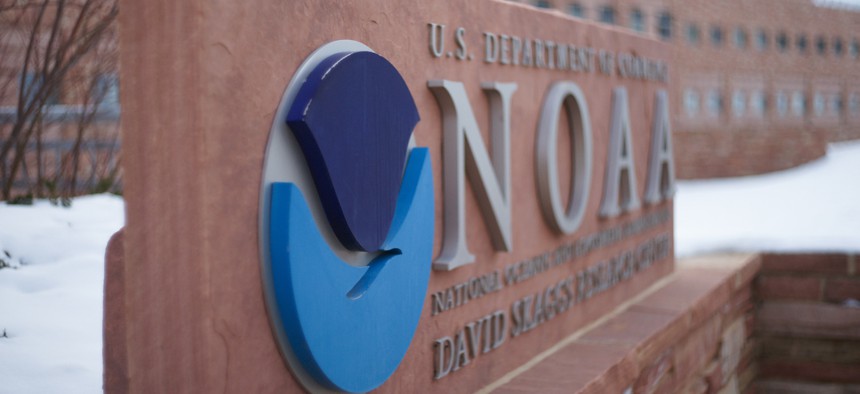
The bill would preserve the National Weather Service within NOAA, but leave the Office of Space Commerce within the larger department. Byunghwan Lim/Getty Images
House Republicans Want NOAA to be an Independent Agency
Removing it from the Commerce Department would boost protections for scientists and eliminate "bureaucratic inefficiencies," they say.
House Republicans are pushing to make the National Oceanic and Atmospheric Administration an independent agency, proposing to remove it from the Commerce Department’s umbrella and boost the role of science at the agency.
The NOAA Organic Act, introduced on Friday by Rep. Frank Lucas, R-Okla., who chairs the House Science, Space and Technology Committee, would formalize the agency’s statutory authorities while removing a layer of political oversight. The measure would enshrine NOAA’s scientific advisory board into law, tasking it with developing research priorities and incorporating the agency’s scientific integrity policy—which aims to protect career scientists from political interference—into all of its decision making processes.
The measure would also require a reorganization plan, which lawmakers said would “reduce overlap between different mission areas.” President Nixon created NOAA by executive order, but its existence has never been codified into law.
“After years of complex organizational challenges, it’s time for NOAA to become an independent agency and reach its full potential,” Lucas said. “The NOAA Organic Act not only gives NOAA formal statutory authority and authorizes its critical mission, but reduces bureaucratic inefficiencies, streamlines oversight efforts, and refocuses core mission areas.”
The bill would preserve the National Weather Service within NOAA, but leave the Office of Space Commerce within the larger department.
Three former heads of NOAA, all of whom served under Republican presidents, testified at a House science committee hearing earlier this year to endorse the proposal. Tim Gallaudet, who served as NOAA administrator under President Trump, said he has observed a “dysfunctional dynamic” between Commerce and NOAA staff throughout this career.
“Paying the Department of Commerce to ineptly duplicate NOAA’s own management system makes no business sense, but the central problem is a lack of shared priorities between the two layers of government,” Gallaudet said. “The absence of collaboration from the political level down to career staff has produced chronic conflict, with NOAA on the receiving end of poorly crafted and sometimes damaging decisions.”
NOAA's independence came into the spotlight in 2019 when President Trump falsely claimed that Alabama was in the path of an upcoming hurricane, which caused the local National Weather Service outpost to subsequently clarify that Alabama was not in the path. Over the following days, Trump continued to insist he was correct and eventually brought out a NOAA map in the Oval Office that appeared to be altered by a marker to show Alabama was included in the storm’s projected path.
The incident was dubbed “Sharpiegate,” and NOAA subsequently released an unsigned statement that said Alabama was “clearly” in some projected paths of the storm and the Birmingham NWS erred in its tweet. NOAA officials eventually conceded political appointees at the Commerce Department played a key role in drafting the press release, leading to multiple independent reviews that found widespread violations of scientific integrity policies.
Rep. Zoe Lofgren, D-Calif., the top Democrat on the science committee, said an earlier draft version of Lucas’ bill marked “a very good start” for the process of making NOAA an independent agency.
“I am eager to work with the chairman and my colleagues on both sides of the aisle to elevate NOAA in the public discourse and see what we can achieve, and I am mindful that this committee's long history of bipartisanship may help us avoid the pitfalls of prior years,” Lofgren said, noting previous legislative efforts to remove NOAA from Commerce’s shadow.
Ultimately, Lofgren, nor any Democrats, have so far signed onto the bill.
Conrad Lautenbacher, who led NOAA under President George W. Bush, said the “ravages of climate change”—of which NOAA serves as one of the federal government’s primary researchers—has made the need for an independent agency more pressing.
“An independent NOAA is needed to be able to address current and future challenges without an antiquated tethered relationship that was poorly conceived from its outset and has frankly, never worked,” Lautenbacher said.







